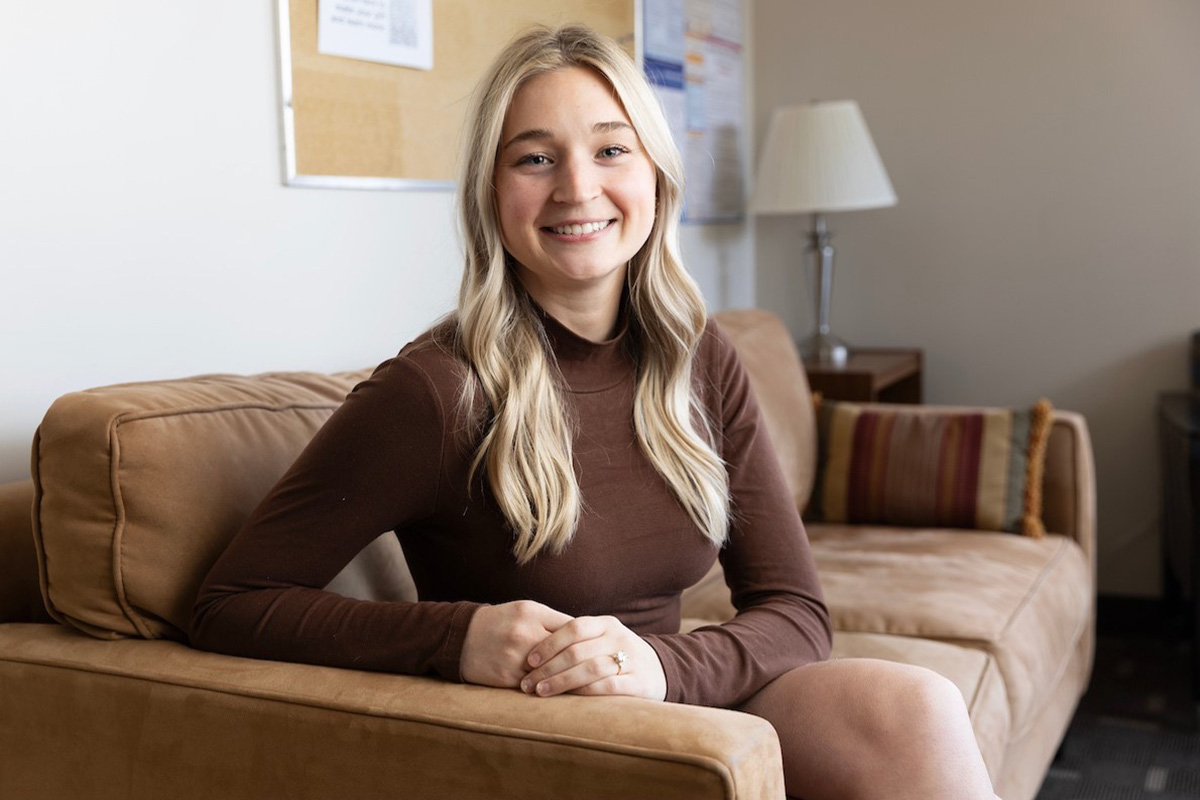The Calling to Be a Social Worker
UNO graduate student Meghan Witte is gaining real-world experience to help college students improve their mental health.
- published: 2025/04/15
- contact: Jared Craig - Office of Strategic Marketing and Communications
- email: unonews@unomaha.edu

For Meghan Witte, choosing her major and future career as a social worker began with a family tragedy.
"When I was a senior in high school, my world suddenly changed — I lost my dad to a heart attack," Witte said. "Afterwards, I spent a lot of time with a great school social worker, and she told me all about her job and what she did."
This enormously positive impact is a testament of the role social workers have in a society, whether it's counseling someone through grief, connecting their communities to vital resources, conducting research on macro-level issues, or advocating for policy change. That high school social worker planted the seed for Witte to pursue this career.
"If I can make somebody feel better and be able to help them, I know it's what I wanted to do," she told herself.
Building Blocks of a Social Worker
Moving from her hometown of Luverne, Minnesota, she defined her time studying at UNO as a chance to move forward after a difficult end to high school. Despite never being a cheerleader before, she joined the Omaha Cheer Team, utilizing her years in gymnastics and dance to try something new. A neighbor in her residence hall and a friend, who was on the cheer team, helped with terminology and preparing for tryouts. She dove into Greek life that opened the campus for her, like raising money for the Dance Marathon that supports children with illnesses.
The Omaha Cheer Team's schedule can be grueling, including athletic games and various campus appearances that add to the traditions of college life. However, she found that it boosted her social life in college. Along with all her leadership roles in her sorority that have developed soft skills, she finds that this has only helped her grow as a social worker. Most importantly, she learned how to address problems as they occur and rally a group for a common goal.
"I didn't realize it at the time, but looking back, I see that it's shaped the leader I am today," she said.
Now Witte, who earned her bachelor's degree in social work, is completing her master's degree in social work with the goal of being a mental health therapist and perhaps teaching.
In the Grace Abbott School of Social Work, she works as a graduate assistant in the practicum office — a role where she was nominated as a graduate assistant of the year for the university. She aids the administrative work of connecting students to their practicums, a sort of internship that is based heavily on hands-on work and an essential part to the School's curriculum.
She is also in her own practicum at the University of Nebraska Medical Center (UNMC), where she meets with students in individual therapy sessions at the university's Counseling and Psychological Services office.
The practicum has given her real-life experience in her career, as well as the confidence to know that she can do the work.
Those around her in the Grace Abbott School of Social Work have seen her practicum help her grow as a young social worker.
"She has a natural ability to make those around her feel safe and comfortable, which is an excellent quality to have as a social worker," said Alisha Olson, a senior practicum specialist at the Grace Abbott School of Social Work. "She is incredibly kind and remembers to check in with you about even the smallest things you might have shared with her."
Advocating for College Students' Mental Health
Witte especially wants to help college students address their mental health as a social worker.
"Especially when I've been in that position, I know having one person that you feel comfortable talking to is just such a privilege,” she said.
Most frequently, she hears students feeling a sense of imposter syndrome, a feeling where individuals doubt their abilities and fear being exposed as a fraud despite their accomplishments.
The feeling is rather common among college students and can ultimately affect academic performance and worsen mental health. A student can criticize their point of view of a class reading, for example, even though it's inherently up to their interpretation. Or they can repeatedly compare their performance to their peers, even though they are offering an intrinsic value to their class or discipline.
Witte finds meaning in reminding students that their college admitted them because of their merits.
"I encourage a lot of self-compassion because we don't do that enough to ourselves," she said. "We need to remind ourselves that we worked hard to get here and belong here. It's not like anyone can walk into college without accomplishments. It's important to look back, see how much you've accomplished, and celebrate your small wins."
To cope with those feelings, she looks to her own college experience and encourages students to get involved. She finds that forming connections with a community bolsters a feeling of belonging.
"It's a wonderful opportunity to broaden horizons and meet new people. College is built for that, and reaching out can make a difference in people's lives," she said.
About the University of Nebraska at Omaha
Located in one of America’s best cities to live, work and learn, the University of Nebraska at Omaha (UNO) is Nebraska’s premier metropolitan university. With more than 15,000 students enrolled in 200-plus programs of study, UNO is recognized nationally for its online education, graduate education, military friendliness and community engagement efforts. Founded in 1908, UNO has served learners of all backgrounds for more than 100 years and is dedicated to another century of excellence both in the classroom and in the community.
Follow UNO on Facebook, Twitter (X), Instagram, LinkedIn, and YouTube.